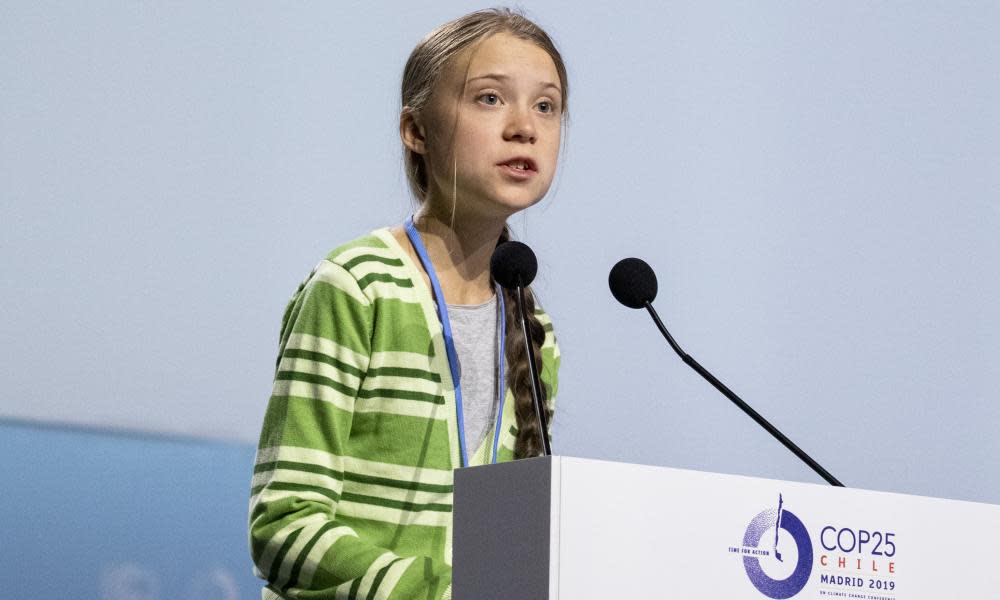Autistic people are not all superheroes, but we’re not all tragic, either

With the return of Netflix’s Atypical for its third season, and the increasingly huge public profiles of neurodiverse figures such as Greta Thunberg, it seems that autism has never been talked about more in the mainstream media. And yet depictions of autism frequently fail those they claim to represent, with dire consequences for autistic people.
Related: Greta Thunberg responds to Asperger's critics: 'It's a superpower'
There are two mainstream narratives surrounding autism: that it is either a blessing or a curse. Either you are gifted with savant-like traits (think Rain Man) and excel in areas such as mathematics, or your autism is the reason you are isolated, alone and miserable. When Greta Thunberg called out ableist bullying and challenged assumptions, even she resorted to the “superpower” stereotype. And in the case of media coverage, these two extremes in expectations are sometimes quite literally presented as a dichotomy, with Forbes running headlines such as “Is Greta Thunberg ‘disabled’ or a superhero?” What if it is neither? Or both?
The disability rights movement is founded on the principle of “nothing about us without us”. So it is difficult to see how representation of autism could ever be positive when we are rarely involved or even consulted. Autistic people are being constrained by the expectations and judgments of neurotypical people because we are so rarely the ones given space to talk about autism. I suspect that is partly due to a belief that autistic people (and disabled people more broadly) cannot speak for themselves. Seldom are autistic people part of the creative teams developing storylines involving autism. Indeed, this was a large problem with Atypical in its first season – none of the writers, directors or producers was autistic, and this resulted in the perpetuation of many stereotypes the community has spoken out against.
What we are seeing in mainstream media is not a true reflection of autism. We are, instead, seeing what neurotypical people think autism is. Savan Gandecha, a YouTube creator and host of #AutismWithSav, told me he agrees that we need to “move away from the stereotypes – that will improve representation in the long run”. Autism is multifaceted, varied and exists on a spectrum, but we never see the diversity of autistic people and their symptoms.
Disability has a 2% representation rate in the popular media, and of that tiny figure, only 5% of disabled characters are played by disabled actors. The idea that this is adequate to represent one of the world’s largest marginalised groups is absurd.
The consequences stretch far beyond simply finding television cringeworthy or uncomfortable to watch. Given that public perceptions of autism are largely predicated on these mainstream portrayals in cinema, television, theatre or books, the consistently poor depictions and subsequent misunderstandings about the condition can be incredibly harmful. Autistic people on screen very rarely engage in behaviours that are seen as more taboo – for example, stimming behaviours such as rocking or flapping – or are seen to have meltdowns, and if they do, it is seen as something to be mocked.
The National Autistic Society reports that 28% of autistic people have been asked to leave a public space because of behaviours associated with being autistic, and I suspect that many of these people are adults. The charity’s study also shows that autistic adults think they are judged to be strange (84%), shy (70%) or antisocial (69%) and that people stare, tut or actively avoid them. The lack of representation of autistic adults adds to the myth that autism is something that is grown out of, which is just not how developmental disabilities work.
Even in journalism, neurotypical (or allistic, or non-autistic) professionals are commissioned to write and speak about autism, seemingly with little understanding that they are talking about a key part of someone’s identity. Most recently, when Greta Thunberg wrote about her autism as a driving force in her activism, the vast majority of articles about it demonstrated a fundamental lack of awareness surrounding the language autistic people prefer.
When I was diagnosed with autism, I went and looked for examples of autistic people like me – whether they were queer, or women, or also had mental health issues. What I found was a thriving community, operating under the hashtag #ActuallyAutistic. At last, I could see people all over the world expressing themselves honestly about their experiences of being autistic.
Depictions of autistic people as a monolith contribute to a culture in which we only recognise the condition in a small percentage of the people who are autistic. Despite what mainstream media would have you believe, not all autistic people are white, cisgender, young or male; for every four men or boys diagnosed with autism, only one woman or girl is – but that is probably because representations aren’t diverse enough. Savan concurs that “more representation is needed from other autistic people who are women and girls and … from BAME backgrounds”. Consequently, autism goes unrecognised and autistic people unsupported. We need representation that is made responsibly and with our input. We simply cannot afford for this misinformation to continue, even in the form of lighthearted teenage television shows.
There has been some progress. Hollyoaks cast autistic teenager Talia Grant to play an autistic character and Channel 4’s Are You Autistic? was hosted by, and with the input of, autistic experts, but this is only a tiny shift and one that is hugely outweighed by poor representation.
Autistic people ought to be the ones leading the conversation surrounding autism. But more importantly, allistic people need to listen and create a space in which we can do this. However, that would require an acknowledgment that no amount of well-intentioned speaking on behalf of autistic people will be anything other than ableist.
• Ellen Jones is a campaigner and creator with a focus on LGBTQ+ rights, mental health and disability

 Yahoo News
Yahoo News 
